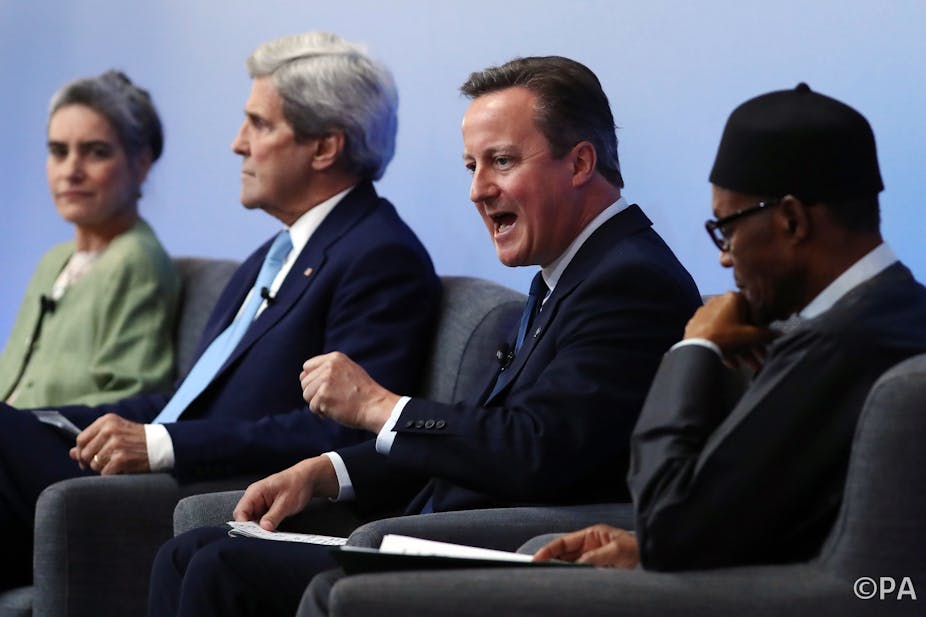Whether or not David Cameron, the UK prime minister, was right to tell the Queen so publicly that guests of the country were leaders of “possibly the two most corrupt countries in the world”, there’s no disputing the substance of his comments. Afghanistan and Nigeria, despite efforts to improve, remain “fantastically corrupt”.
So while certainly undiplomatic, his comments were largely warranted – both countries are regularly ranked near the bottom by Transparency International’s Corruption Index. Afghanistan ranked 166 out of 168 countries in 2015, beaten to the wooden spoon by only Somalia and North Korea. Nigeria is a more nuanced story but in 2015 it ranked 136. While it is, strictly speaking, incorrect to identify the country as one of the two most corrupt nations in the world, the country has a long and well-documented history of corruption that still hampers its development.
Nigeria: the ten-percenters
Nigeria has been dogged by corruption since independence in 1960. Politicians of the first republic were nicknamed the “ten-percenters” for their practice of demanding 10% of the value of contracts they awarded. The man who coined this nickname, Major Chukwuma Kaduna Nzeogwu, led the overthrow of the government and ushered in an era of military rule which – unfortunately for the people of Nigeria – was to be hardly less corrupt.
Stories of military corruption surrounding dodgy arms deals are rife – Nigerian military officers were named in the Lockheed bribery scandal as having reportedly received US$3.6m in kickbacks from Lockheed Corporation when the country purchased six fighter jets in 1975.
Weapons are at the high-end of corruption, but one of the biggest scandals involved something as mundane as cement. In exchange for a large kickback in 1975, the military placed a cement order that amounted to two-thirds of the estimated cement needs for the entire continent of Africa. This came at a cost of 25% of Nigeria’s oil revenues for that year. This is significant given that oil accounts for 98% of Nigeria’s export earnings. In spite of efforts to erase corruption in the oil industry, it was revealed by Nigeria’s auditor general that US$16 billion (£11 billion) of Nigeria’s oil revenues disappeared in 2014.
Successive administrations foundered over the following four decades amid allegations of graft and political corruption including, in an episode which would be comic if it weren’t so serious, a scandal involving a US congressman caught stuffing cash for bribing Nigerian officials into his freezer.
Buhari strikes back
The retort to Cameron’s words from Nigeria’s president, Muhammadu Buhari, was swift and cutting. Buhari acknowledged that his country was very corrupt and that he was partly elected to continue the fight against graft, but added that the return of stolen assets sitting in UK banks would help a great deal.
Today Nigeria has more institutions in place to fight corruption. In 2015, Buhari established a seven-member advisory committee to tackle corruption, drawn mainly from academia. In addition, the Anti-Corruption and Criminal Justice Reform Fund was established with the financial support of the Ford, Open Society and MacArthur Foundations to support the Buhari administration in its resolve to fight corruption.
Buhari, who styles himself a “convert” to democracy after ruling Nigeria as a military dictator in the 1980s, is credited with jailing as many as 500 top politicians, officials and military officers during just under two years in power between 1983 and 1985. After his removal from power (which had quite a lot to do with the unpopularity in high places of his campaign, which he dubbed: “War on Indiscipline”), succeeding administrations essentially turned corruption into an instrument of state and billions were siphoned from the public purse to line overseas bank accounts and build luxurious homes.
As the Archbishop of Canterbury, Justin Welby, was heard to say during the prime minister’s exchange with the Queen: “But this particular president is not corrupt … he’s trying very hard.”
Dismal in Afghanistan
The situation in Afghanistan has been even more dismal. According to Transparency International, a “dysfunctional police and judiciary is allowing impunity for the corrupt” and public trust has fallen to crisis levels. Less than half of victims of violent crimes report them to the police.
The development of infrastructure is hamstrung by graft – in 2012, according to the United Nations, half of Afghan citizens said they had paid a bribe while requesting a public service. The total cost of bribes paid to public officials amounted to US$3.9 billion (£2.7 billion).

As with Nigeria, there is hope for Afghanistan, embodied by its current leader. Ashraf Ghani has an impressive resume. He is a noted academic [whose research](http://thediplomat.com/2014/10/interview-ashraf-ghani/](http://thediplomat.com/2014/10/interview-ashraf-ghani) directly focuses on state building. His expertise led him to work for both the United Nations and the World Bank and he co-founded the Institute for State Effectiveness. He is also the author of several well-received books and articles in this area of state building and fighting corruption.
But there are still problems – one recent example is the allegation that Afghan officials lied in 2015 about the number of schools and students there were in order to get increased US funding for its educational programme. According to John Sopko, the special inspector general for Afghanistan reconstruction:
These allegations suggest that US and other donors may have paid for schools that students do not attend and for the salaries of teachers who do not teach.
So it’s probably a bit unfair to class Cameron’s overhead conversation with the Queen as a “gaffe”. While there are now hopes that the leaders of both Afghanistan and Nigeria will try to chart a course towards transparency and accountability in their countries, it is clear they face considerable uphill battles in tackling the corruption that permeates every level of their governments. They need support in their efforts – so it’s appropriate to acknowledge that fact and it would be wrong to sugar coat the tough reality.

